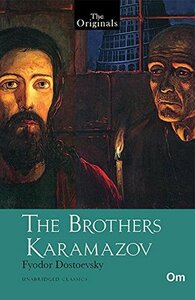You need to sign in or sign up before continuing.
Take a photo of a barcode or cover
Dear Ivan, I too love sticky leaves and blue skies. I wish I could love my own sister as you love your most wretched brother.
I’ve seen it claimed that the Grand Inquisitor is a condemnation of socialism and perhaps that was the intention, however, I was largely struck by the line (paraphrasing) “we will take the bread they made then give it back to them and they will be grateful” seems more akin to capitalism to me. Tho I guess the way capitalism is currently operating it’s more “we will take the bread they make and give them back crumbs”. I’m not grateful for crumbs.
I guess really it was most likely intended to be a critique of the Catholic Church and religious institutions and the way they enforce— force— faith, which is no true faith right? Faith cannot be true unless freely given. Alyosha in the face of Ivan’s reason still maintains total faith. I wish I could be so sure of something. Descartes would be appalled at the conclusion that there is no rational argument that can arrive at the existence of god. One must take a leap of faith regardless. Did Dostoevsky ever read Kierkegaard? Or did they arrive at the same conclusions independently? Faith can only exist in the presence of doubt, isn’t that what Conclave was about?
Maybe I’m not an atheist. I suppose I am. But still, what biological purpose does my wonder at sunlight hitting a patch of grass serve? I’m not interested in the real answer. I will maintain my wonder.
I’ve seen it claimed that the Grand Inquisitor is a condemnation of socialism and perhaps that was the intention, however, I was largely struck by the line (paraphrasing) “we will take the bread they made then give it back to them and they will be grateful” seems more akin to capitalism to me. Tho I guess the way capitalism is currently operating it’s more “we will take the bread they make and give them back crumbs”. I’m not grateful for crumbs.
I guess really it was most likely intended to be a critique of the Catholic Church and religious institutions and the way they enforce— force— faith, which is no true faith right? Faith cannot be true unless freely given. Alyosha in the face of Ivan’s reason still maintains total faith. I wish I could be so sure of something. Descartes would be appalled at the conclusion that there is no rational argument that can arrive at the existence of god. One must take a leap of faith regardless. Did Dostoevsky ever read Kierkegaard? Or did they arrive at the same conclusions independently? Faith can only exist in the presence of doubt, isn’t that what Conclave was about?
Maybe I’m not an atheist. I suppose I am. But still, what biological purpose does my wonder at sunlight hitting a patch of grass serve? I’m not interested in the real answer. I will maintain my wonder.
This is my favorite novel of all time. I've read it three times: when I was twenty, when I was thirty and when I was forty. I'll probably read it again when I'm fifty.
The three brothers can be explained as the thinker, the doer and the observer. Ivan is the thinker who with the theory that everything is permitted in the absence of a God or an afterlife. Dmitri, the doer, is an impulsive type who likes broads, booze and gambling. The youngest brother Alyosha is the observer, who visits people and listens to them. The fourth (half-)brother, Smerdyakov is fawning but sly.
There's a contrast between Katerina Ivanovna and Grushenka. They both have a soft spot for Dmitri, despite his obvious flaws. Katerina has a high rank in society, but has hysterical fits and can be treacherous. Grushenka is a “fallen woman” in the eyes of society, but has a noble nature. All characters have their own style of speech: the cackling of Mrs. Khokhlakova, the incoherent speeches of Dmitri, the intellectual musings of Ivan, the wise words of the starets…
Exoteric religion, focused on worldly display, is represented by excessively fasting, superstition, icons and the power hungry Grand Inquisitor. Esoteric religion, focused on inner faith and caritas, is represented by the starets, who's Alyosha's spiritual guide and sends him out into the world.
Most of the action takes place within three days; only the trial takes longer. Dostoevsky attended trial to prepare this book. He satirizes the false rhetoric of the lawyers. His style is verbose, but he never gets boring. It has philosophical and psychological depth, but also enough suspense and humor to remain exciting over the whole length.
The three brothers can be explained as the thinker, the doer and the observer. Ivan is the thinker who with the theory that everything is permitted in the absence of a God or an afterlife. Dmitri, the doer, is an impulsive type who likes broads, booze and gambling. The youngest brother Alyosha is the observer, who visits people and listens to them. The fourth (half-)brother, Smerdyakov is fawning but sly.
There's a contrast between Katerina Ivanovna and Grushenka. They both have a soft spot for Dmitri, despite his obvious flaws. Katerina has a high rank in society, but has hysterical fits and can be treacherous. Grushenka is a “fallen woman” in the eyes of society, but has a noble nature. All characters have their own style of speech: the cackling of Mrs. Khokhlakova, the incoherent speeches of Dmitri, the intellectual musings of Ivan, the wise words of the starets…
Exoteric religion, focused on worldly display, is represented by excessively fasting, superstition, icons and the power hungry Grand Inquisitor. Esoteric religion, focused on inner faith and caritas, is represented by the starets, who's Alyosha's spiritual guide and sends him out into the world.
Most of the action takes place within three days; only the trial takes longer. Dostoevsky attended trial to prepare this book. He satirizes the false rhetoric of the lawyers. His style is verbose, but he never gets boring. It has philosophical and psychological depth, but also enough suspense and humor to remain exciting over the whole length.
dark
mysterious
slow-paced
Plot or Character Driven:
Character
Strong character development:
Yes
Loveable characters:
Yes
Diverse cast of characters:
Yes
Flaws of characters a main focus:
Yes
masterpiece
Teveel filosofie uitgelegd door lange gesprekken. Gaat teveel over christendom. Gestopt op pagina 99
emotional
slow-paced
Plot or Character Driven:
A mix
Strong character development:
Yes
Loveable characters:
No
Diverse cast of characters:
No
Flaws of characters a main focus:
Complicated
liked the philosophy just very long and was reading another book I prioritized
Good murder mystery story. and great philosophical work. I'd like to revisit it and explore different themes. It took a year, but I greatly enjoyed reading this book.
challenging
reflective
slow-paced
Plot or Character Driven:
Character
Strong character development:
Yes
Loveable characters:
Complicated
Diverse cast of characters:
Yes
Flaws of characters a main focus:
Yes
challenging
reflective
sad
slow-paced
Plot or Character Driven:
Character
Strong character development:
Yes
Loveable characters:
Complicated
Diverse cast of characters:
Yes
Flaws of characters a main focus:
Yes
I'm glad that now I'll have something to talk about with Timothée Chalamet (just in case).





